by Claire Chambers
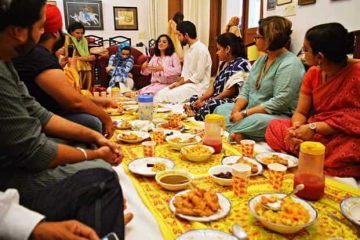
The last book I edited was about love and desire, and then I was slowly turning my attention to that other great universal pastime: food. For food is love; love in a more complex sense than mere carnality, a relationship that is layered as a paratha. The Pakistani novelist Bina Shah wrote to me about the nexus between food and love as follows: ‘Muslim South Asian cookbooks abound with tale after tale of a young child growing up watching a beloved grandmother preparing elaborate meals, sitting at the family dastarkhawan amid dozens of relatives and friends, participating in an Eid feast or perhaps wooing a possible lover with […] dishes’. Memories of love and fellowship season our memories of food, infusing particular meals with much more than the sum of their ingredients.
I was musing in this way as I began commissioning and editing a new anthology of Muslim South Asian food writing likely to be titled Desi Delicacies. But before I could finish my work, the SARS-CoV-2 pandemic really took hold and went global. I have written about how this initially paralysed me with fear so that—although I do not mention this in the article—I was unable for some time to do any further reading or writing.
I know that I wasn’t alone in experiencing writer’s block at the beginning of this lockdown. Moreover, since benefitting from an illuminating and curiously uplifting article by Aisha S. Ahmad, an academic who is no stranger to danger and puts the current health crisis in the context of other emergencies, this paralysis no longer worries me. As Ahmad writes, ‘the legacy of this pandemic will live with us for years, perhaps decades to come. It will change the way we move, build, learn, and connect. […] Your first few days and weeks in a crisis are [when] I would focus on food, family, friends, and maybe fitness’. Her recommendation that you should focus all your attention at the early phase of any crisis in looking after your mental health and securing your family and your home is sound advice. It is nothing to feel guilty about if it’s impossible to concentrate on reading, writing, and other creative or intellectual tasks at this time.
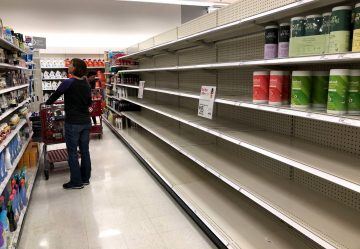
For me that early period of the crisis was like a disaster movie, but a really, really boring one. People in the UK just seemed highly confused and fixated on buying things to see them through any lockdown situation. As a result, shops were selling out of all sorts of produce. Not only were there the famous shortages of medical supplies, hand sanitizer, and toilet roll, but also of foodstuffs with a long shelf life, such as pasta, tinned tomatoes, and rice. I refused to panic-buy, but after our younger son got ill with suspected coronavirus and we had to self-isolate, I came to regret not getting involved in the consumerism frenzy. As a vegetarian, it was to my dismay that our household quickly ran out of fresh vegetables. We still had some fruit, but I’m lucky if the nutrient-sceptical boys eat one piece a day, let alone the recommended five! We live in Leeds, a big city that was a few days ahead of more rural York in terms of the crisis’s impact, so I told my colleagues in the neighbouring metropolis where I teach to brace themselves. One co-worker felt so concerned about my family’s chances of catching scurvy that he was eager to drive the fifty-mile round trip from York to Leeds and back just to deliver us some brassicas from his allotment. This generous offer came despite the fact that he is in his early seventies and therefore belongs to a high-risk group!
Luckily our son recovered and I managed to find a vegetable-box company willing to deliver to a new customer, so my septuagenarian friend didn’t have to execute his mercy mission. But his kindness alerted me to another aspect of food in the time of corona: the good deeds and community spirit that the crisis has engendered, alongside selfishness and stockpiling. As David Miliband recently put it on the World Economic Forum podcast World Versus Virus, ‘Survival now is a team sport, and life is a team sport’.
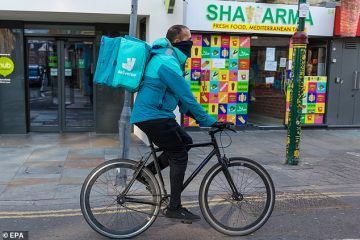 A group who have particularly distinguished themselves in these unprecedentedly hard times are British Muslims. Al Jazeera reports that the Green Lane Mosque in Birmingham has started a food-delivery service for vulnerable individuals. Meanwhile the British-based charity Muslim Hands launched a campaign to get meals to those in need. This comes as no surprise, for food is a spine running through one of Islam’s five pillars, that of zakat or charity. Feeding the sick or poor is a crucial aspect of such good works. During Ramadan, when the devout deprive themselves of sustenance from dawn to dusk for a month (no mean feat during the long summers of northern countries like England), zakat becomes more central to faith, and Muslims accordingly donate more of their money and time to the needy. With the fasting month about to start and no sign of shelter-at-home orders lifting, these charitable Muslims will put their bodies to even greater test for the sake of spirituality and the greater good. And many believers worldwide will be deprived of breaking their fasts communally. The mosque is usually a particularly popular space to take iftar, but this year Muslims are having to think creatively and use technology to convey the accustomed sense of togetherness virtually.
A group who have particularly distinguished themselves in these unprecedentedly hard times are British Muslims. Al Jazeera reports that the Green Lane Mosque in Birmingham has started a food-delivery service for vulnerable individuals. Meanwhile the British-based charity Muslim Hands launched a campaign to get meals to those in need. This comes as no surprise, for food is a spine running through one of Islam’s five pillars, that of zakat or charity. Feeding the sick or poor is a crucial aspect of such good works. During Ramadan, when the devout deprive themselves of sustenance from dawn to dusk for a month (no mean feat during the long summers of northern countries like England), zakat becomes more central to faith, and Muslims accordingly donate more of their money and time to the needy. With the fasting month about to start and no sign of shelter-at-home orders lifting, these charitable Muslims will put their bodies to even greater test for the sake of spirituality and the greater good. And many believers worldwide will be deprived of breaking their fasts communally. The mosque is usually a particularly popular space to take iftar, but this year Muslims are having to think creatively and use technology to convey the accustomed sense of togetherness virtually.
Unsung heroes of the food chain are the low-paid grocery and supermarket employees working to restock those bare shelves, as well as the refuse workers toiling to take away our food and other waste—often at great personal risk. These labourers have to suffer rudeness, people jostling for scarce products, and sometimes downright abuse. At best there is an atmosphere of tension, with customers hurrying through stores as they worry about catching the virus. Lips purse as expenditure is calculated to fit budgets shrunken by furlough, pay cuts, or sudden unemployment. Many shoppers aren’t keeping to the two-metre social distance rule, and there has never been a more pressing need for hygienic physical barriers to separate cashiers from the dozens of people they serve each shift.
In Britain, each Thursday evening we celebrate those on the metaphorical battlefield of the National Health Service with a round of applause and #ClapForTheNHS on Twitter. My husband is a family doctor who now works some shifts in the red zone for Covid-19 patients, so my heart swells with pride at this. But I am uncomfortably aware that the hashtag is woefully insufficient. We need to clap for all those fulfilling that other essential service of providing food. In doing so, the unsung heroes of the supply chain will become more visible, from lorry drivers right through to restaurateurs.
Having been summarily shut, many cafes and restaurants are going out of business. Near our house is the deprived Leeds ward of 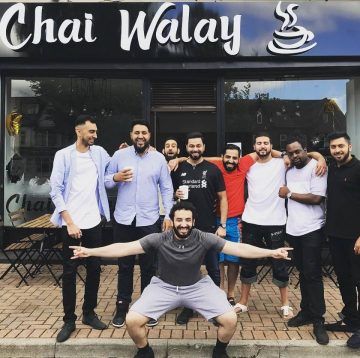 Harehills, known affectionately as ‘little Pakistan’. It has been the site of violent urban protest, most famously in the 2001 northern riots, but with lesser disquiet flaring up at intervals. Its desi cuisine already being quite well established, the district had been experiencing a foodie efflorescence in recent years. A number of excellent and affordable eateries began serving food from Afghanistan and South Korea to Ethiopia and Syria. At the same time, Harehills’ array of South Asian outlets became exponentially more diverse, with a high-end gelato joint, two chai bars, and a halwa puri outlet rubbing shoulders with the usual fried chicken shops and mainstream tikka masala places. The last time I went to Chai Walay just before the lockdown, the young British-Pakistani owner was visibly jittery about his young business’s future and how he would pay his employees. I really hope when all this is over his fine establishment is still standing.
Harehills, known affectionately as ‘little Pakistan’. It has been the site of violent urban protest, most famously in the 2001 northern riots, but with lesser disquiet flaring up at intervals. Its desi cuisine already being quite well established, the district had been experiencing a foodie efflorescence in recent years. A number of excellent and affordable eateries began serving food from Afghanistan and South Korea to Ethiopia and Syria. At the same time, Harehills’ array of South Asian outlets became exponentially more diverse, with a high-end gelato joint, two chai bars, and a halwa puri outlet rubbing shoulders with the usual fried chicken shops and mainstream tikka masala places. The last time I went to Chai Walay just before the lockdown, the young British-Pakistani owner was visibly jittery about his young business’s future and how he would pay his employees. I really hope when all this is over his fine establishment is still standing.
Restaurants with greater collateral to draw on are reinventing themselves to feed the poor, the vulnerable, and key workers. Or, less altruistically, they rely on Uber Eats, Deliveroo, and other precarious gig economy workers to send food out to people craving the fine dining experience in their homes. Finding themselves suddenly stripped of orders from shuttered restaurants, wholesale suppliers like Bradford’s Delifresh have opened themselves up temporarily for emergency online shopping by the general public.
We are being urged to flatten the curve of the epidemic by cocooning at home. Other curves are not being flattened. My biggest personal tragedy so far this pandemic is that I’ve been forced to retire as a Zumba instructor after eight happy years of teaching dance fitness, when the gym I worked in closed its doors. (On reflection, that’s probably the second biggest sadness, as I’m heartbroken about our elder son’s GCSE exams having been cancelled.) Given gym and sport field closures, along with what has been termed the C19 diet, many people in rich countries are gaining weight. Easily distracted on a reduced or no workload, with snacks aplenty constantly under their noses, and Australians drinking to self-medicate, bored quarantiners are indulging themselves. As something of a double whammy, social distancing means that outdoor exercise is highly restricted in the UK, and outright banned in Italy, Spain, and France. Despite abounding temptations and obstacles, others are using the stay at home orders to cut down on alcohol consumption or embark on new indoor fitness regimes.
By now European panic-buying and stockpiling have somewhat calmed down. Although I bought a lota early on, our cupboard is now restocked with toilet roll. It’s still difficult to get quite a few culinary items, though, and I miss being able to pop to the shops for random ingredients. I’m well aware that to have this niggling away at me is a luxury. Many are going hungry, while women’s rights groups around the world are reporting that sheltering in place is leading to a spike in domestic violence, so I am lucky to feel sated and safe (if a little bored) in my house.
More positively, the editor of Huffpost Japan has observed that remote working and people spending more time at home has already contributed to a more equitable though still not equal gender distribution of household chores and cooking in the East Asian country. It will be interesting to see if this trend continues once workplaces reopen and everyone busies up again. And there’s supposed to be less food waste than normal—another unexpected but welcome consequence of the current predicament.
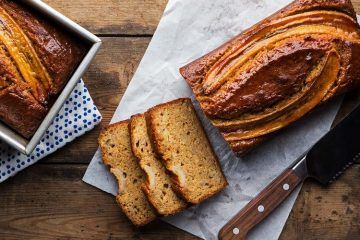 Food functions both to nourish and to comfort us. With more leisure time yawning in front of people, many are turning to baking to occupy their days, quieten their nerves, and fill their bellies. Writing for Good Food, Emily Laurence explores the transnational craze for banana bread during this pandemic. Laurence accounts for the loaf’s popularity because of its wholesomeness, its long tradition stretching back to the Great Depression, and purse-friendly cost, in addition to some nostalgic and mood-boosting properties.
Food functions both to nourish and to comfort us. With more leisure time yawning in front of people, many are turning to baking to occupy their days, quieten their nerves, and fill their bellies. Writing for Good Food, Emily Laurence explores the transnational craze for banana bread during this pandemic. Laurence accounts for the loaf’s popularity because of its wholesomeness, its long tradition stretching back to the Great Depression, and purse-friendly cost, in addition to some nostalgic and mood-boosting properties.
Things should slowly return to some semblance of normality but, to adapt the title of Muneeza Shamsie’s anthology of post-9/11 Pakistani writing, ‘the world [has] changed’. Indeed, Muneeza herself wrote in an email to me about this crisis, ‘So strange, one’s known world, and all the certainties of what one should or should not do, all gone for a six’. She’s right; all the things we take for granted have shifted tectonically almost overnight.
Yet, if music (and writing and other kinds of art) be the food of love, play on—especially in the time of corona. (That is to say, as per Aisha S. Khan, play on now that we’re through the first few days and weeks of the crisis and have moved into what she calls the ‘new normal’ phase of corona.) Hold your loved ones close, eat hearty meals, listen to your favourite album on repeat, and, as soon as you can concentrate, read!
